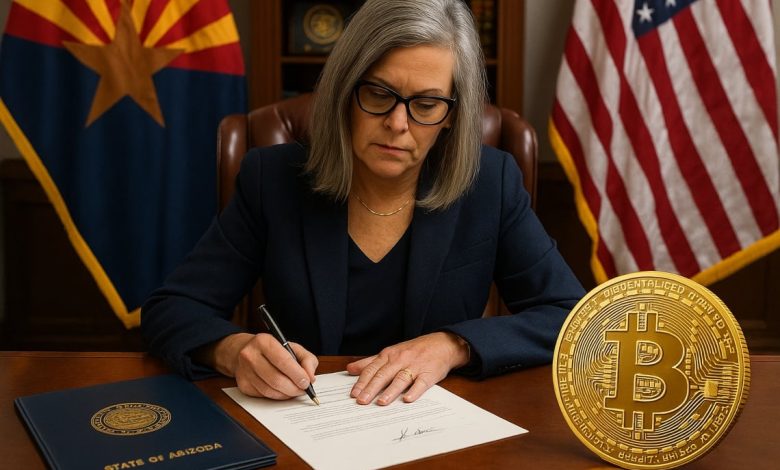Veto of the Bitcoin proposal in Arizona: public investments rejected

Arizona has seen that Governor Katie Hobbs has denied a legislative proposal that will allow the use of public funds to invest in Bitcoin.
Senate Bill 1025 (SB1025), known as the “Arizona Strategic Bitcoin Reserve Act,” allowed state creatures to allocate up to 10% of public funds in cryptocurrencies, with a specific focus on Bitcoin.
Because of its introduction, the proposal has led to a strong debate, but Hobbs's intent is clear: the stabbing of the retirees is not a basis for dangerous experiments.
In the official statement Sent to Senate President Warren Petersen, Hobbs emphasized that the Arizona pension system was among the most solid in the United States, thanks to careful and conscious Investment.
According to the governor, the opening of public investments in “unsted” properties such as Bitcoin will put valuable resources for retirees at risk.
Katie Hobbs's veto prevents public investment in Bitcoin in Arizona
Bill SB1025, approved with a divided vote in Parliament (31-25-4), aimed at creating a regulation framework for a “Strategic Reserve of Bitcoin” at the state level, allowing a allocation of up to 10% to cryptocurrencies in public funds.
The law provided that the reserve can be managed in coordination with a hypothetical federal bitcoin fund, thus returning to the state's financial policy orbit.
Accordingly, Arizona lawmakers approved the second bill, Senate Bill 1373 (SB1373), designed as a complement to SB1025.
This second text, called the “Digital Assets Strategic Reserve Fund,” aimed at adjusting the management of digital assets obtained through state allocations or seizures, especially from criminal proceedings.
Unlike the SB1025, however, SB1373 did not allow public investments, but the rules for the preservation of property and some updates on financial procedures were established.
Despite approved the commission and home, SB1373 remains awaiting Hobbs' signature. The governor's decision on this proposal may determine the future regulation of the Digital Asset management in Arizona.
In the SB1025 veto, Arizona joined a list of five US states that rejected similar proposals to create public bitcoin reserves. In total, there are 19 states that are currently considered or introduced a similar law.
However, the road will appear anything but simple: in states such as Montana, South Dakota, North Dakota, Pennsylvania, and Wyoming, many of these initiatives are faced with contests or stuck at the voting stage.
This phenomenon implies a growing institutional precaution towards digital properties as a public value store, especially considering their volatility and the lack of established previous ones in long-term management of pension funds.
“` Html
The reactions to veto's decision
“`
The choice of hobbs has caused mixed reactions. On the one hand, those who doubt applauded a careful and responsible stance, aimed at protecting public savings.
On the other hand, well -known figures in the crypto world such as Anthony Pomplano, a investment fund manager, criticized the transition, calling it an example of “political ignorance” on the subject.
Pompliano emphasized that expertise in investments is important, but veto suggests an underestimation of opportunities offered by the bull and sector of the cryptocurrencies.
However, it is important to emphasize that the political discussion embraces the dangers and benefits, and the governor prefers not to further expose the pension system to a market that is highly speculative.
Despite the veto, Arizona continues to be a fertile land for regulations related to cryptocurrencies and digital assets, especially in Bill SB1373, focusing on methods of caution rather than direct investment.
Moreover, the episode reflects a national trend: many state constituents have adopted careful procedures.
Although more than 20 states have shown interest in the subject, political resistance and fear of volatility prevents the concrete carrying out public reserves in Bitcoin or other cryptocurrencies.
This stalemate suggests that it is necessary to develop a more stable regulatory framework and a greater understanding of the risk of lawmakers, so that more knowledge of public investments may be considered in the future.
The road toward a balance between change and financial security
The veto's Governor Katie Hobbs In the proposal for public investment in Bitcoin in Arizona features a delicate balance between financial change and the protection of public savings.
On the one hand, the growth of cryptocurrencies drives institutions to consider new investment models; On the other hand, experience and mildness impose limitations, especially when it comes to money intended for retired ones.
For states interested in regulating digital assets, the Arizona case suggests that the best path may first consist of control and management policies, as suggested by SB1373, before allowing direct investment.
Although the SB1025 veto represents a step back, there is a clearly growing interest in public management of resources in innovative forms such as Bitcoin.
Digital possessions are no longer a marginal curiosity: however, their use of public entities requires clear regulations and strategic techniques.
In front of the legislative, it remains to be seen as the governor Hobbs will sign on SB1373, a signal that can start a more careful but effective path toward a structured presence of cryptocurrencies on state budgets.
So far, Arizona's position itself is one of the most careful states in the USA, but the debate remains open. Lawmakers and citizens need to continue monitoring technological and financial developmental development to ensure that change does not compromise public finance stability.
In summaryVeto votes of Governor Hobbs in public investment in Bitcoin represents a responsible choice but divides the experts and public.
As Arizona progresses with the policies of cautioning and managing digital assets, the future of more brave public investment in cryptocurrencies remains defined.
This balance will be important to change interest in concrete results, maintaining the security of public funds amid decisions.




